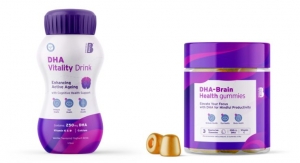12.01.14
The European Food Safety Authority (EFSA) has approved an Article 14 Health Claim that recognizes omega-3 docosahexaenoic acid (DHA) contributes to normal brain function.
The Panel found there was sufficient evidence to indicate that DHA contributes to normal brain development, and that this may lead to a beneficial physiological effect for infants and children. According to an abstract published in EFSA Journal, “The Panel has already assessed a claim on DHA and maintenance of normal brain function with a favorable outcome. The Panel noted the well-established role of DHA in brain function. The Panel considers that the role of DHA in normal brain function applies to all ages, including brain development in infants and children. The Panel also notes that the developing brain accumulates large amounts of DHA, particularly during the first two years of life, but also later and throughout childhood.”
As a result of these conclusions, EFSA has approved the health claim “DHA contributes to normal brain development.” To use this claim, foods for older infants and children under 24 months must provide 100 mg DHA in one or more servings, and food for children ages 2-18 must include 250 mg DHA in one or more servings.
According to the Global Organization for EPA and DHA Omega-3s (GOED), the panel was already aware of DHA’s benefits, due to its 2010 Article 13 Health Claim related to DHA and maintenance of normal brain function. While the current Article 13 Health Claim may be applied to foods containing 250 mg of DHA in one of more serving, GOED said the new ruling is significant in that it has a stronger emphasis on the importance of DHA for children, if put into practice as it currently stands.
EFSA’s stringent review process may influence other international regulatory bodies, GOED suggested. For example, the organization cited a recent decision by the Chinese Nutrition Society that established DRIs for EPA and DHA, but chose not to set one for children from 4-18 years old.
The Panel found there was sufficient evidence to indicate that DHA contributes to normal brain development, and that this may lead to a beneficial physiological effect for infants and children. According to an abstract published in EFSA Journal, “The Panel has already assessed a claim on DHA and maintenance of normal brain function with a favorable outcome. The Panel noted the well-established role of DHA in brain function. The Panel considers that the role of DHA in normal brain function applies to all ages, including brain development in infants and children. The Panel also notes that the developing brain accumulates large amounts of DHA, particularly during the first two years of life, but also later and throughout childhood.”
As a result of these conclusions, EFSA has approved the health claim “DHA contributes to normal brain development.” To use this claim, foods for older infants and children under 24 months must provide 100 mg DHA in one or more servings, and food for children ages 2-18 must include 250 mg DHA in one or more servings.
According to the Global Organization for EPA and DHA Omega-3s (GOED), the panel was already aware of DHA’s benefits, due to its 2010 Article 13 Health Claim related to DHA and maintenance of normal brain function. While the current Article 13 Health Claim may be applied to foods containing 250 mg of DHA in one of more serving, GOED said the new ruling is significant in that it has a stronger emphasis on the importance of DHA for children, if put into practice as it currently stands.
EFSA’s stringent review process may influence other international regulatory bodies, GOED suggested. For example, the organization cited a recent decision by the Chinese Nutrition Society that established DRIs for EPA and DHA, but chose not to set one for children from 4-18 years old.



























